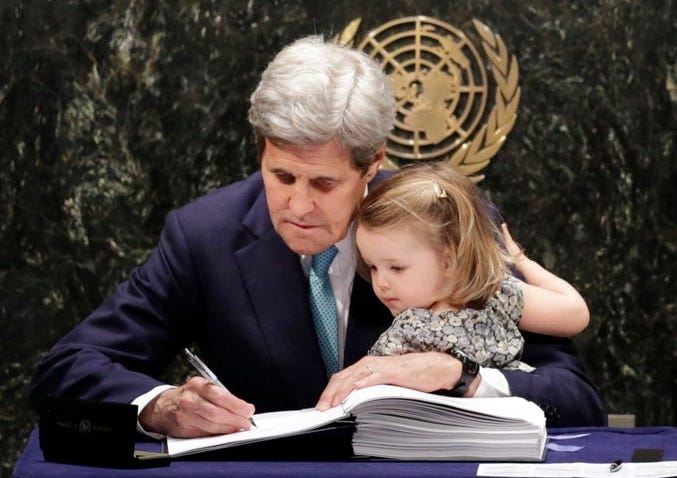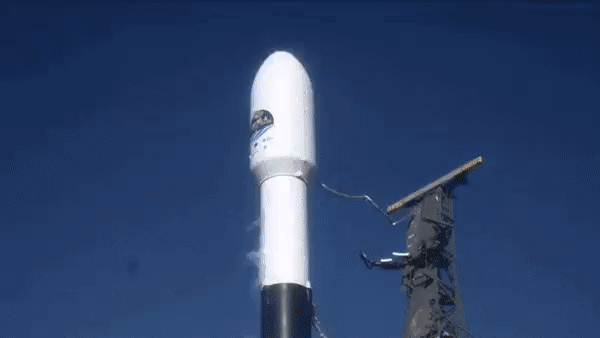In John Kerry, Biden takes the 'safe' play on climate change
Plus, who's winning the race to replace jet fuel; and the business of destroying the Amazon

If ever there was a national role that needed a bold, business-focused, and internationally progressive play, this was the one. Instead, President-elect Joe Biden took the safe route, choosing John Kerry as his climate czar. In doing so, he may have missed a historic opportunity.
At 76, Kerry is a global diplomat whose credentials are beyond question. He knows all the world leaders. He ran for president himself. He helped author the Paris Climate Accord five years ago and is as dedicated to fighting climate change as they come. Perhaps nobody was better suited to help America retake its seat at the head of the climate change table under a Biden presidency.
But he’s not the one to bully the banks into halting fossil fuel investments, or reluctant companies into disclosing more emission data. Climate change activists might need to look to incoming Treasury Secretary Janet Yellen, or the new head of the Securities and Exchange Commission, for those.
I first covered John Kerry when he was a junior senator to Ted Kennedy in Massachusetts in the late ‘80s, and I was a junior reporter in Boston. I later would see him at hearings and social gatherings in Washington D.C., at the bar with his team late nights in Davos, and then of course, as he ran for president. He will be welcomed by media and politicians back into the globalist fold.
Yet the pick seems startlingly status quo. Another of the old Obama crowd re-engineered with new responsibilities. A safe pair of hands as Biden tries to rebuild what’s left of Obama policy after a four-year attack. Even the nickname climate czar evokes almost a ceremonial position.
Kerry can be expected to push Biden’s $2 trillion climate plan, but he won’t get far working across the aisle, which was a key opportunity given the growing number of Republicans interested in climate change. He’ll be long on international pomp and circumstance, but short on twisting the financial arms needed to make a fossil fuel transition work. He’ll be 80 when Biden’s first term is done.
That’s why Biden’s team is signaling they will add a domestic climate change role to the mix. Someone to manage policy while Kerry glad-hands on the global stage.
This was the role that needed a warrior. Someone who the progressives can identify with, who is mad and ready to shake up the system. A woman perhaps, who can push Wall Street from the inside, rather than lecture it from the outside. I have always been a Kerry fan, and I know he’ll give it everything he’s got. But I can’t help thinking someone else on Biden’s team will need to step up if we want to make history here.
More insights below. . . .
Also, this will be the last Callaway Climate Insights this week. We’ll be back next week after the Thanksgiving holiday in the U.S. Don’t forget to contact me directly if you have suggestions or ideas at dcallaway@callawayclimateinsights.com.
The tech race to eliminate airline emissions
. . . . The advent of “flight shaming” a few years ago in Europe alerted the world to the danger of airline emissions. While not one of the leading causes of greenhouse gas pollution, even at 2% airline emissions are a growing issue for both airlines and airports. In this report, Gunnar Wetlesen breaks down the four main technologies major aircraft companies are working on to replace traditional jet fuel, and finds that a lot more technology and ingenuity are going to be needed.
Trains are already electrified in much of the world and auto manufacturers are in a race to electrify the majority of vehicles as well. However, electric planes, other than small aircraft, are not feasible as batteries do not provide the same energy density as liquid fuels. Even ocean going ships are facing a challenge to find a fossil fuel replacement.
Flying burns 1.5 billion barrels of jet fuel every year. It is responsible for 12% of all transport CO₂ emissions and 2% of global carbon emissions. Aircraft were largely exempted from the Paris Climate Accord, but are widely cited, especially in Europe, for being a primary contributor. A report last week said half of all commercial airline emissions came from just 1% of global fliers. . . .
The big business behind the destruction of the Amazon
. . . . The world points a finger at Brazil leader Jair Bolsonaro for allowing the destruction of the Amazon, which produces about 6% of the world’s oxygen and acts as a carbon sink for emissions. But Western companies, from oil and gold to banks and soy and beef conglomerates, have long contributed to the destruction and deforestation, which runs about 200,000 acres a day, writes Mike Molinski. Addressing the business angle, not just the politics, is a key goal.
Environmentalists are quick to blame the Brazilians for their role in the destruction of the Amazon, but it’s not just the Brazilians to blame. Western corporations are equally responsible for destroying the rainforests. Many of those products — soy, beef, oil and gold — are products that were made from Amazon lands that were cleared or burned so those products could be enjoyed by people reaching from New York to London and Beijing.
“The problem is not the fires that have blanketed the Amazon. The problem is deforestation,” said Paulo Artaxo, a global climate change researcher at the University of Sao Paulo. “The rainforests have been transformed into agriculture to grow soy and for cattle to graze.”. . .
Data driven: See the seas from the stars
. . . . The rate of sea level rise over the past 10 years is 50% faster than during the previous 10 years (4.5 cm/decade versus 3.0 cm/decade), says Eric Leuliette, NOAA’s program scientist for Sentinel 6 Michael Freilich. The Sentinel-6 Michael Freilich satellite was launched this weekend from Vandenberg Air Force Base in California. The mission is designed to capture detailed measurements of sea-surface height and other important ocean features. Data from the satellite will be critical in NOAA’s efforts to track sea-level rise and study tsunami dynamics, the El Niño Southern Oscillation, accurately predict hurricane intensity, and more. Read more about the project. . . .
News briefs: Arecibo, Lebanon’s cedar trees and high-speed trains
Watch this: The impact of climate change is already being felt in the Western Isles of Scotland. Rising sea levels and powerful storms are eroding the dunes and machair land that protects many low-lying communities. BBC Scotland News spoke to Uist crofter Iain Macdonald, whose land is slowly being consumed by the sea.
Editor’s picks:
Climate change is killing Lebanon’s cedar trees
Investor expectations for Paris-aligned accounts
UN: Amount of materials extracted from Earth tripled since 1970
Hawaiian seaweed makes cows 90% less gassy
Latest findings: New research, studies and projects

ESG equity investing: A short survey
In this survey, researchers briefly sum up recent academic results on socially responsible investing (SRI). They split the survey into six thematic parts: data, investors, performance, portfolio integration, climate change risk, and theoretical models. In the conclusion, the author writes: “There are … signs that investors are shifting resources towards green firms simply because brown firms are increasingly perceived as bearing risks that are hard to evaluate. In the long run, the multiplication of natural disasters is likely to force governments to fiscally penalize polluters. The rise of green activism and lobbying is also a threat for brown corporations. More and more, sustainable firms may be considered as safer bets (rightfully so).” Author: Guillaume Coqueret, EMLYON Business School. Available at SSRN.
More of the latest research:





